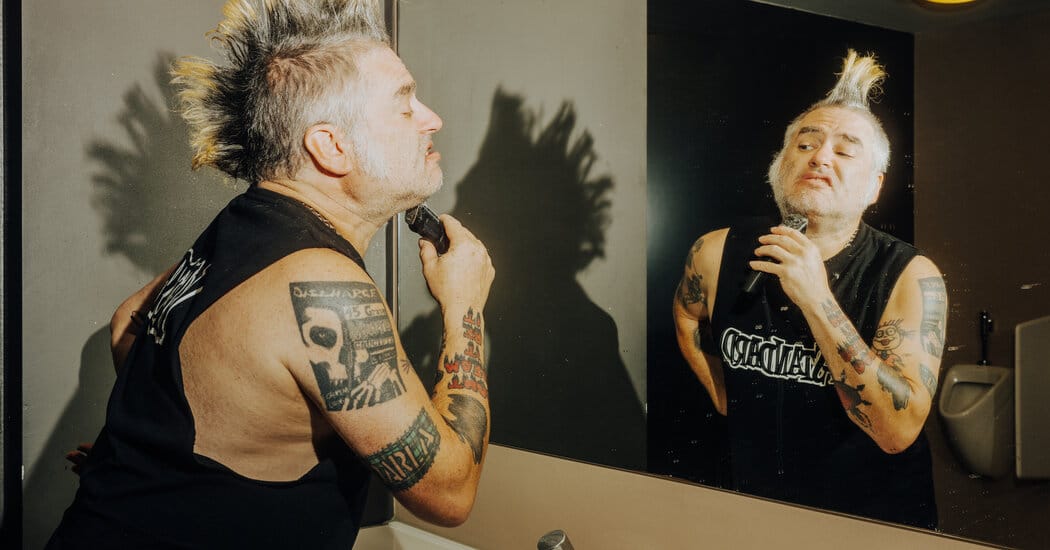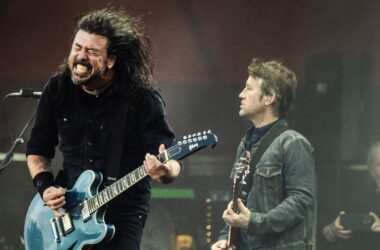[ad_1]
The punk rock pioneers chose freedom — and chaos — over major labels. Pulling the plug while things are still working is one final act of rebellion.
“It’s like going to your own wake.”
Mike Burkett, known exclusively in the punk rock world as Fat Mike, was talking about the farewell tour for his band, NOFX, during which the group is traveling to 40 cities, with 40 songs per concert, celebrating their 40 years as a band.
The tour started a year ago in Barcelona and will end where it all began for them, in Los Angeles, with three shows from Oct. 4-6. Fat Mike, 57, along with Eric Melvin, Aaron Abeyta and Erik Sandlin are, collectively, experiencing the feels.
“This is it,” Fat Mike, the band’s singer, songwriter and bassist, said of the prospect of touring again after this. “We aren’t Kiss, or Black Sabbath, or Mötley Crüe. This is the end.”
“It’s kind of sad, saying goodbye,” said Mr. Abeyta, 58, the group’s guitarist and trumpet player, who goes by the nickname El Hefe. “We’re family. We’re basically brothers. We’ve lived on the road together, on a bus, sometimes in the same bed.”
“It’s weird, it’s uncertain, it’s scary,” said Mr. Sandlin, 57, the group’s drummer who was nicknamed Smelly for the drug-fueled flatulence of his earlier days. (He’s been sober and clean for years.) “I feel like I’m losing a leg.”
Mr. Melvin, 57, the band’s guitarist, acknowledged there was some tension over walking away while the band was still successful. “But I’m just trying to enjoy it, trying to feel it,” he said. “We’ve all gone through it in our own way, but we’ve gone through it together. We’ve got some scars, scar tissue, some sensitivities that can’t be touched anymore, but I can focus on the good stuff.”
NOFX may not be a household name, but to those in the punk world, it’s been the gold standard that’s endured the ebbs and flows of hardcore music. The band’s reputation has rested not only on its songs — packed with crunchy riffs, breakneck drumming and melodic vocals with classic SoCal harmonies — but also on how its musicians have handled their careers. As teenagers, the members of the group decided they did not want to work for anyone, and 40 years later they are retiring as punk rock royalty — and one of the most prominent examples in pop culture of a D.I.Y. ethic taken to extremes.
Formed in 1983, well before more popular punk bands like Blink-182, Green Day and the Offspring, NOFX has never had a radio hit and refused to join the parade of alternative bands on MTV in the 1990s. The group has been defiant and prolific, producing 15 full-length albums — one gold record, “Punk in Drublic,” among them — 17 EPs and countless seven-inch records.
Despite minimal media coverage, the band says it has sold more than seven million records, exclusively releasing them on independent labels, chief among them: Fat Wreck Chords, an imprint co-owned and controlled by Fat Mike.
“We’ve always done things ourselves,” Fat Mike said.
While most bands look to attract fans, NOFX spent four decades perfecting the art of something more akin to anarchist self-centered sabotage. Like a show in London in 2000 when Fat Mike, Mr. Melvin and Mr. Abeyta decided to take ecstasy before going onstage. “Melvin is trying to play the accordion and he can’t,” Fat Mike said, laughing. “It was our biggest show and we took the punk way out. We were all dying laughing.”
“Who cares?” he added. “Why NOFX are so good is because we’re having a better time than our fans.”
In the band’s formative years, NOFX’s defining quality was how bad the group was — bad musicians and bad singers, with Fat Mike’s distinctive, whiny-sounding lead vocals and Mr. Melvin’s guttural, monotone screams. They were kids with trauma — abandonment, molestation, addiction — who found a community that accepted them. In “Hepatitis Bathtub,” the band’s unflinching autobiography, you learn about Fat Mike drinking out of a beer bong made from a sex toy, Mr. Sandlin buying his first drum set with drug money and Mr. Abeyta being interrogated by the secret service for a counterfeit cash scheme.
The early days were defined by blistering, puerile songs, many of which did not have choruses — a style that remains their trademark. A show promoter, concerned by how poorly they sounded, once paid the band $13 not to play.
But after Fat Mike heard Bad Religion’s seminal punk album, “Suffer,” which was released in 1988, he and the other members of the group decided to “stop sucking.”
While Mr. Sandlin is not sure Fat Mike’s vocals ever achieved the goal — “Mike’s voice started out horrible. It got mediocre. Now it’s back to horrible.” — the band slowly got more proficient, starting with the release of “Ribbed,” in 1991. That year, the music industry was turned on its head by the release of Nirvana’s “Nevermind,” an “extinction-level” event in pop music, according to Fat Mike. Mainstream music took an edgy turn and, within a few years, bands calling themselves punk, including NOFX, found themselves courted by major labels. But Fat Mike — just Fat Mike — wanted to stay the D.I.Y. course.
“I started to doubt,” Mr. Abeyta said. “I was looking at these other bands that used to open for us, sleep on our bus when we were at hotels — Green Day, Offspring — and we’re watching them all blow up and make millions. We all thought about it, me, Smelly and Melvin. Are we making the right decision?”
Fat Mike’s main argument — “You are getting into bed with a corporation. You are not an artist. You are an employee.” — eventually won over the others. “I convinced the guys. It took me four months,” he said.
“We were doing fine,” he continued. “We bought houses. I asked the guys, ‘Are you happy with what you’re doing?’”
The others agreed they were, so Fat Mike said, “If we just keep doing what we’re doing, we’ll have one of the most awesome careers ever and we’ll be happy the whole time.”
That’s mostly what happened. NOFX traveled the country and eventually the world, playing more than 3,000 shows across 33 countries and more than 600 cities.
“Over the years I’ve been asked if we made a bad decision,” Mr. Melvin said. “Sure, we could have made more money but also burned out quickly or gotten a lot of popularity which would have caused a backlash.” He said he knows people who signed to major labels. “They make a salary, but they’re told what to do, when they need to write, when they need to produce a new album, when they need to tour — that wasn’t for us.”
Controversies aside — most of which involved drugs, onstage banter taken too far and the unpredictability of both the band and its fans — the members of NOFX managed to do something most people can only dream of: They avoided having a day job for 40 years.
What’s the secret to such an unusual path to success?
“To have fun,” Mr. Sandlin says. “To have no expectations, enjoy the moment. I see a lot of bands make the mistake of wanting to be huge — and they start missing the moment.”
“People don’t understand money or success,” Fat Mike said. “Success is happiness. And if you’re happy, you know what there’s isn’t? More happiness.”
Along the way, there have been failed business ventures like Mr. Melvin’s cafe, “Spun Melvin,” and Mr. Abeyta’s nightclub, “Hefe’s Nightclub,” and, for Mr. Melvin, feeling the pressure to drink and do drugs because that’s what people expected of him. “That became a job.”
Now the final tour. The band is drawing large, often sold-out crowds of 5,000 to 15,000 fans per show. “We declined to work with Live Nation or AEG except for a couple of cities,” Fat Mike said. “And we only play parking lots, campgrounds and parks. Our last three shows are going to be on a pier. We’ve always done things ourselves.”
Fat Mike was talking from his home in Las Vegas, where he partly owns and operates the Punk Rock Museum. It is one of the many business ventures he gets visibly excited to hype up — a portfolio that has reportedly made him millions but often leads to a palpable amount of frenetic energy emanating from him.
“That’s why I need to get tied up and beat,” he said of his S&M fetish and love of wearing women’s clothes, both of which have been incorporated into the band over years. “It’s the only time my mind stops working.”
He leads a busy life and felt it was time to say goodbye to NOFX — “We’re not a well-known band as far as popular music, but we’re loved. After 40 years, I’m so tired of it.” — even if the rest of the band needed convincing once again.
“None of them wanted to quit,” Fat Mike said of his bandmates.
“At first, we did resent him,” Mr. Abeyta said. “We didn’t agree with ending this. We were still making money, we still have an audience, people are still showing up at our shows. Their kids are growing up and coming to the shows. We’re like the Grateful Dead of punk rock.”
“Smelly was so pissed,” Fat Mike added. “I just took away his livelihood. I gave him no choice. And everyone was like, what are we going to do for money?”
For Mr. Sandlin, that could mean touring as a drum tech or building out his surfboard side hustle. Mr. Melvin has been working on a solo musical career and became a life coach. Mr. Abeyta recently got into acting. In addition to an eight-episode stint on “Mayans,” he’s shooting a film with Vince Vaughn and Al Pacino.
Fat Mike said he set up this last tour so “my boys” are financially secure, though when asked about this point, Mr. Melvin shut it down: “I don’t want to talk finances.”
Like any long-term relationship, NOFX’s scar tissue has been built up by what’s been left unsaid.
“I don’t want him to feel like he has to keep taking care of us,” Mr. Melvin said. “I’m afraid he’s thought that for a long time, which is kind of funny because I feel we’ve taken care of each other.” After a sizable pause, he added, “Quite a lot.”
“The four of us have a bit of an avoidance of conflict,” Mr. Melvin continued. “Maybe there were things we should have said to each other like, ‘I love you’ more, or ‘something seems to be going on with you, buddy, and I just want you to know that I’m here for you.’”
The band still has one another, at least until Los Angeles. When discussing the final show, Fat Mike got choked up. “Because it’s the last time anyone is going to see NOFX. I don’t know how I’m going to get through it,” he said. “Probably with a drug that makes me the least emotional.”
Source link











